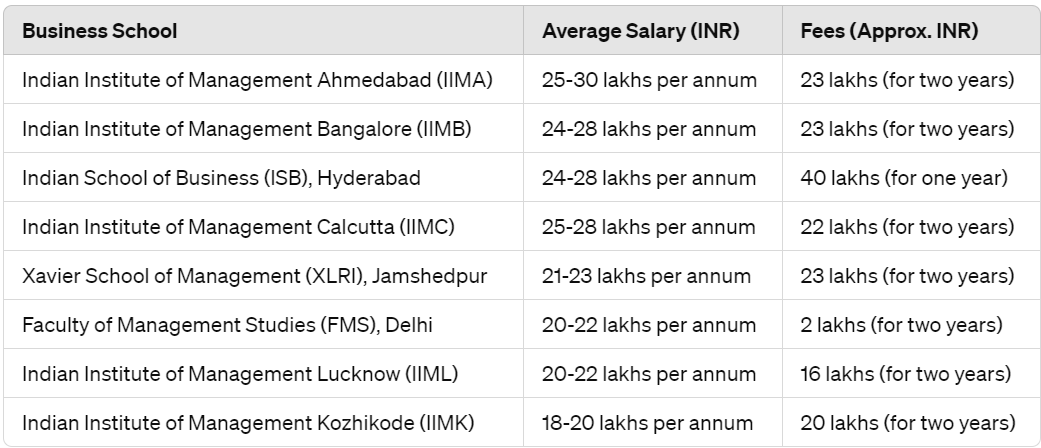MBA ADMISSIONS : CHOOSING BETWEEN BUSSINESS SCHOOLS

Explore the premier business schools in India, showcasing their average salaries and fees in a concise table below:

Are you considering pursuing an MBA but feeling overwhelmed by the multitude of business schools out there? Choosing the right MBA program is a pivotal decision that can shape your career trajectory. With so many options available, it's crucial to navigate this maze wisely. In this blog post, we'll delve into essential factors to consider when weighing your options for MBA admissions.
ALSO READ: Managing student loans after MBA graduation: Repayment options and advice
- Define Your Goals: Before embarking on your MBA journey, take some time for introspection. What are your career aspirations? Are you looking to switch industries, climb the corporate ladder, or start your own venture? Clarifying your goals will help you narrow down your options and choose a program that aligns with your ambitions.
- Accreditation and Reputation: Ensure that the business schools you're considering are accredited by recognized accreditation bodies such as AACSB, AMBA, or EQUIS. Additionally, research the reputation of each school within the business community. Consider factors such as alumni success, faculty expertise, and industry partnerships.
- Curriculum and Specializations: Evaluate the curriculum offered by each MBA program. Does it provide the knowledge and skills you need to achieve your career goals? Look for schools that offer specializations or concentrations relevant to your interests, whether it's finance, marketing, entrepreneurship, or sustainability.
- **Faculty Quality and Resources: **The expertise and accessibility of faculty members can significantly impact your learning experience. Research the credentials of the professors teaching in your prospective programs. Additionally, consider the resources available to students, such as career services, networking opportunities, and access to industry leaders.
- Global Opportunities: In today's interconnected world, global exposure can enhance your MBA experience and broaden your perspectives. Look for business schools that offer international exchange programs, study abroad opportunities, or have a diverse student body and faculty.
- Class Size and Culture: Consider the size and culture of each MBA program. Some students thrive in smaller, tight-knit cohorts, while others prefer the diversity and resources of larger classes. Additionally, assess the school's culture and values to ensure they align with your own.
- **Cost and Financial Aid: **Pursuing an MBA is a significant investment, so it's essential to consider the cost of tuition, fees, and living expenses. Research the financial aid options available, including scholarships, fellowships, and assistantships. Evaluate the potential return on investment (ROI) of each program in terms of post-graduation salaries and career advancement opportunities.
ALSO READ : Part-Time vs. Full-Time MBA Programs: What is the best choice for you
CONCLUSION :
In conclusion, selecting the right business school for your MBA journey requires careful consideration of various factors, including your goals, accreditation, curriculum, faculty, global opportunities, culture, cost, location, alumni network, and personal fit. By thoroughly researching and evaluating your options, you can make an informed decision that sets you on the path to success in your career. Good luck on your MBA admissions journey!
Confused About Your Career? Don't let another opportunity pass you by. Invest in yourself and your future today! Click the button below to schedule a consultation and take the first step towards achieving your 99.99ile CAT score.
